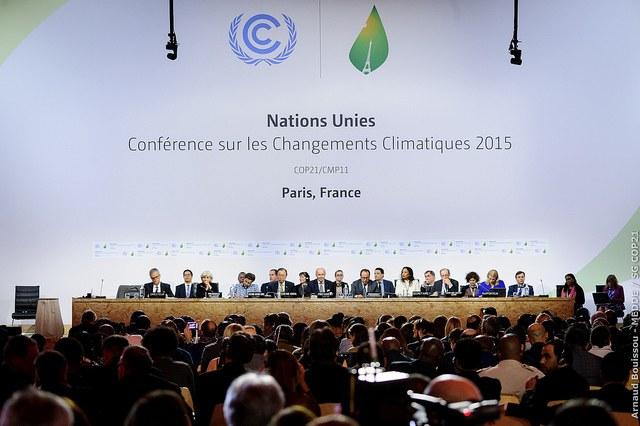
Despite Republican opposition, this week the Obama administration paid the first installment of its $3 billion promise to help developing nations tackle climate change risks. The $500 million disbursement to the United Nations’ Green Climate Fund (GCF) comes over a year after the White House first made this commitment, and three months after President Obama reiterated this promise at the COP21 climate talks in Paris.
This latest U.S. contribution means the fund has reached almost 70 percent of its total goal to raise the $10.3 billion that wealthy nations promised in the months leading up to COP21.
This initial round of funding will finance climate change mitigation and adaptation projects through 2018. It is up to the GCF to decide how it will fund initiatives that will avert the most catastrophic risks related to climate change, ensure sustainable long-term economic growth, and maintain stability and security in the countries facing the most climate-related threats in the coming decade.
At least 50 percent of the funds are to be targeted toward the most vulnerable nations, including least developed countries, the small developing island states and African nations.
After the U.S., the largest contributors to this fund are Japan, the United Kingdom, France and Germany.
Republicans on Capitol Hill, led by Sen. John Barrasso of Wyoming, have attacked this disbursement. At a Senate hearing on Tuesday, Sen. Barrasso questioned Heather Higginbottom, deputy secretary of state for management and resources, about the nature of this $500 million contribution. At question is what the Republicans say is the questionable legal authority to distribute money to the GCF as it is technically a new program.
Bringing up the ongoing Flint water crisis, the senator told Ms. Higginbottom: “I just think it’s hard to explain to taxpayers in struggling communities across our country . . . that the president and this administration is willing to give $500 million as a handout to foreign bureaucrats instead of addressing real problems here at home.” Sen. Barrasso also described the GCF as an “international slush fund” that is unauthorized by Congress.
In response, Ms. Higginbottom said that the funds, which were sent to the World Bank on Monday, were reviewed and found to be in full compliance with U.S. law.
Watch for the Republicans to continue hammering the Obama administration on this issue, as the federal government’s fiscal 2017 budget calls for an additional $750 million to be paid to the GCF. Indeed, while climate change to become an especially politicized and partisan battle here in the U.S., it is worth nothing that the George W. Bush administration pledged $2 billion to the Climate Investment Funds in 2008. The U.S. government will spend $37.9 billion on foreign aid this fiscal year.
For President Obama, who hit a roadblock with the Supreme Court’s recent decision to stay new rules covering reductions in emissions from power plants, his administration’s commitment to the GCF bolsters his legacy as having the most aggressive (or destructive, depending on one’s point of view) agenda related to the environment and climate change. Meanwhile, this follow-through on climate change assistance will infuriate the four remaining Republicans who are campaigning for their party’s presidential nomination. All of them have said they will undo Obama’s climate plan if they succeed him on Jan. 20.
Image credit: COP Paris (Flickr)

Leon Kaye has written for 3p since 2010 and become executive editor in 2018. His previous work includes writing for the Guardian as well as other online and print publications. In addition, he's worked in sales executive roles within technology and financial research companies, as well as for a public relations firm, for which he consulted with one of the globe’s leading sustainability initiatives. Currently living in Central California, he’s traveled to 70-plus countries and has lived and worked in South Korea, the United Arab Emirates and Uruguay.
Leon’s an alum of Fresno State, the University of Maryland, Baltimore County and the University of Southern California's Marshall Business School. He enjoys traveling abroad as well as exploring California’s Central Coast and the Sierra Nevadas.














